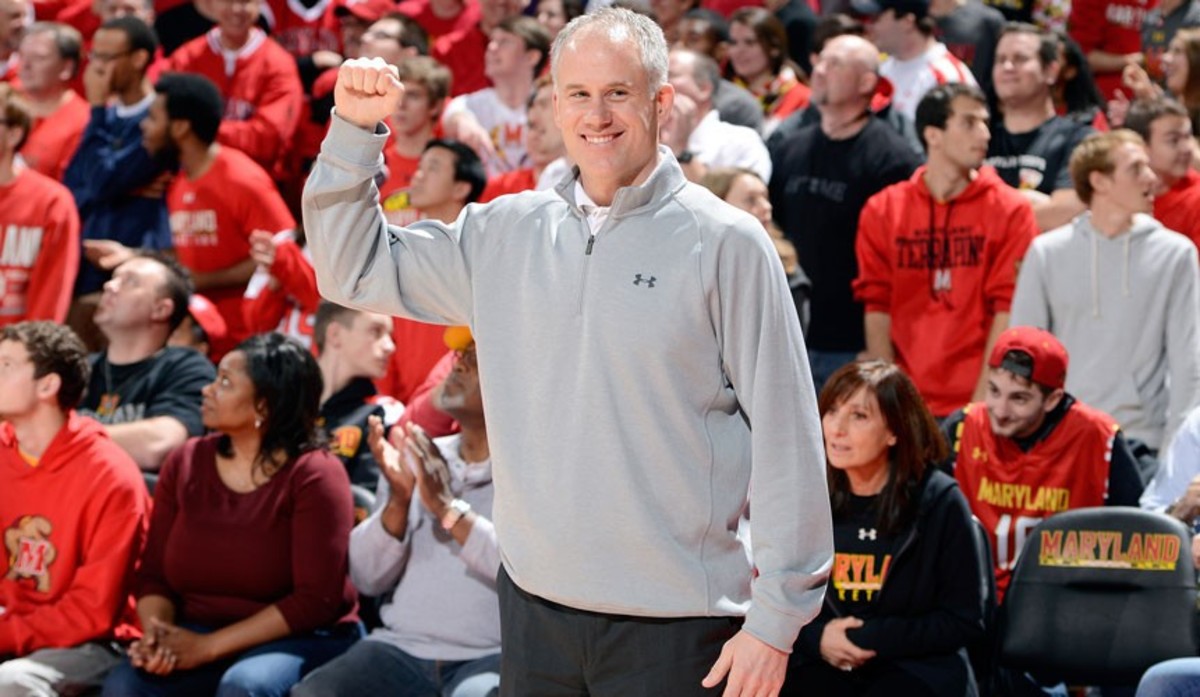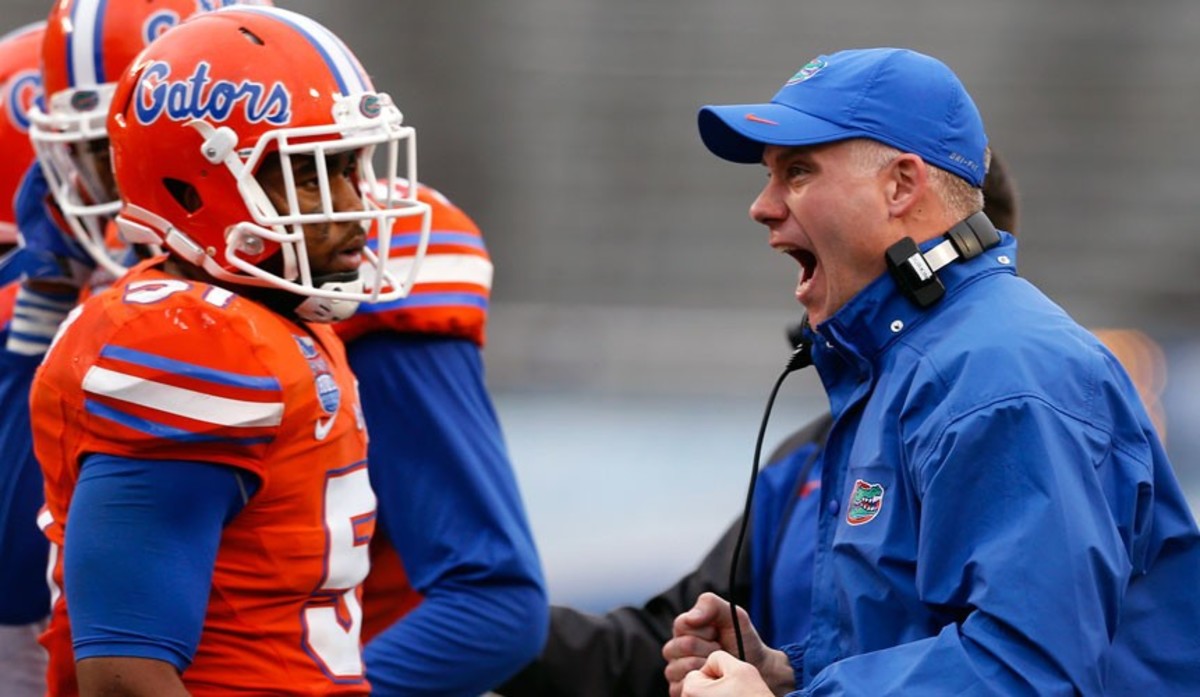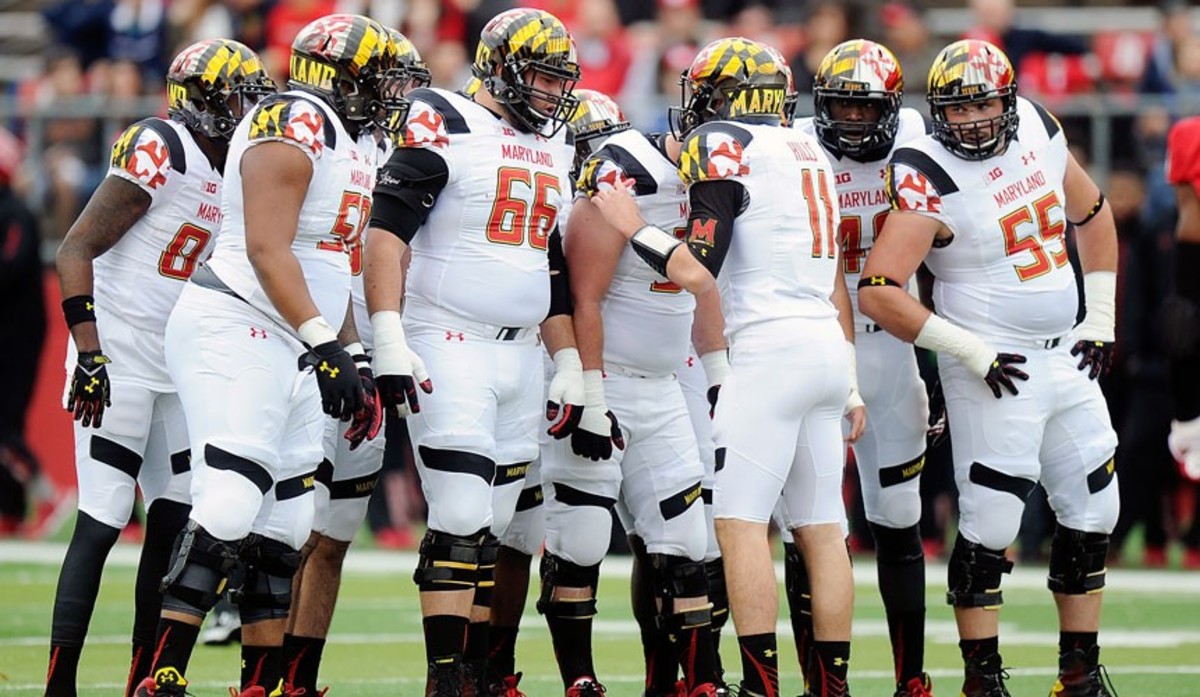The right man for Maryland? Terps coach D.J. Durkin on his new job and playing one-on-one versus Jim Harbaugh

Since D.J. Durkin finished his playing career at Bowling Green in 2000, he has rocketed through a run of working for college football's boldfaced names and blueblood programs. Durkin, 38, was hired as a graduate assistant on Urban Meyer's first staff at Bowling Green and Jim Harbaugh's first staff at Stanford. He worked as the special teams and defensive coordinator at Florida during his time in Gainesville from 2010–14. After spending a season as Harbaugh's defensive coordinator at Michigan in '15, Durkin got his first shot to be a head coach. His task is to push perpetually mediocre Maryland into the elite company of his old employers.
Durkin recently sat down for wide-ranging Q&A in his office and talked about his new job, the genesis of his boiling intensity and the last movie he watched in a theater. He also discussed the Terrapins' football identity and what it's like to play basketball one-on-one against Harbaugh—without fouls.
Campus Rush:Let's start with Maryland's recruiting. What has your reception been like so far?
D.J. Durkin: Everything's been really positive so far. We've made a real point of reaching out. My first month or two on the job, I talked to every coach and trainer—just about everyone. But it was needed. They wanted to be heard, too. They wanted to air out their grievances.
This area, the high schools recruit here about as hard as colleges do. Anyone can go anywhere. It's all divided with the private schools and public schools. And so they recruit like crazy.
CR: Some high schools around here have basketball recruiting staffs that target middle school kids. There are no restrictions, and they do it year-round. Everyone around here thinks that type of recruiting is normal.
Durkin: That's just common practice here. Everyone knows each other, too. It's a heavily populated place, but anyone involved in high school athletics, they all know each other because of that. They've been going to those games and recruiting and doing all that since guys were in sixth, seventh grade. It's nuts. It's wild.
CR:Your offensive coordinator Walt Bell, 31, has quickly earned a reputation as one of the country's sharp, young offensive minds. What led to your hiring of him from Arkansas State?
Durkin: That was a big search for me. My background is defense and special teams. I talked to a lot of guys. My first conversation [with Bell] was on the phone. We spoke for a couple hours. What impressed me was he didn't go right into scheme. A lot of guys start there. He wanted to build the offense around effort and toughness and being physical. We spoke for a few hours and he moved himself to the top of the list after that conversation.
Where he's been, he's been tempo and spread. But one of the best things [is] he has the ability to adapt to your scheme based on personnel. Whatever the personnel is, he's able to adapt. He's got the confidence and wherewithal and knowledge. We're all coming into a new situation, and you have to be able to adapt.
CR: You had to adapt when Scott Shafer stepped down as Maryland's defensive coordinator this spring. What should we expect from his replacement, Andy Buh?
Durkin: We were together for three years back at Stanford from 2007 to 2009. We stayed in close touch and I consider him a good friend. He's a detailed and technical coach and knows the terminology and scheme of everything we do. He has coordinator experience and the ability to come and not change a bunch of things, which would be hard for our players. He also can call the defense, which is important to me because I don't think a head coach can effectively do both, be the head coach and call the plays.

G Fiume/Getty Images
CR:In terms of unlocking the potential of this job, how important is Maryland's connection to Under Armour?
Durkin: That relationship makes you one of two places in the country. We all know the other one (Oregon, given its ties to Nike). So, yeah, it's very unique. I look at it as our job now as coaches of this program to go put a product on the field that people are excited about.
[Under Armour CEO] Kevin Plank is an ultra-competitive guy. Obviously he's done an unbelievable job with that. Twenty years of existence, what [Under Armour] has done is remarkable. And so, that to me—more than going to him and saying we need this or that—I want to put it together and get that going. I think this is a partnership we both can benefit from and make it huge.
CR:What's the reality of Kevin's day-to-day involvement with the program?
Durkin: The best way to characterize Kevin's involvement is that he's there whenever we need him. He's obviously a critical part of our success and cares a great deal about Maryland. He is there in every way possible, but he's not hanging around wondering what we're doing on third-and-six, as he is tremendously busy growing Under Armour into a dominant world brand. It's an ideal situation as we begin to build a relationship together. I look forward to growing that relationship.
CR: Your first job in football was as a graduate assistant for Urban Meyer at Bowling Green. How was that?
Durkin: That was wild. It was also about as valuable an experience as you can have.
I didn't realize it at the time. I was still an undergrad, so I'm still kind of in college. I had no idea what I was doing. You look back, that was life-changing. The rest is history. Really, in kind of joking about it, it was nuts. But I learned about the right way to coach and how to run a program for sure.
CR: What was your interview like?
Durkin: The first time I went in there, he ripped me up and down for 30 minutes. He tried to talk me out of it, made sure I wanted to do it. So then he was like, "Well, you need to think about this. Come back and see me in two days."
So I came back and he's sitting behind his desk and he looked away from me when I walked in. The secretary told him I was here, so he looked when I walked in, but then never looked again. He was looking at his computer, doing something and was talking to me. "Are you sure?" "Yeah, coach, I'm sure."
Then he suddenly [jumped up] and got this far from me. "ARE YOU SURE?" I didn't even know the guy at the time. I was like, "Uhhhh, yeah, O.K." I walked out of his office like, What the heck did I just do?
CR: I'd imagine your early days at Stanford under Jim Harbaugh were a lot like the early ones at Bowling Green under Meyer. Is that accurate?
Durkin: It was absolute mayhem. It really was.
When I first got there, it was like, oh my gosh. Then you finally spend more time with Jim. The guy is really smart. Extremely smart. Everything is for a reason, but he loves chaos. That's just how he operates. He loves confrontation, chaos, conflict. He doesn't want it to be everyone comfortable, this is the schedule. He just loves throwing a wrench in the works.
So, when you first get there, it's like, what's going on? But it was great. To see someone impose their will, their confidence, their vision on a program, to totally change it—total 180. Stanford was known as a soft, academic, wine-sipping program. Now it's the total opposite. He definitely imposed his will on the place.
CR:One Meyer-Harbaugh question. I know how much respect you have for both guys and how appreciative you are of the opportunities they gave you. Are they more similar or different?
Durkin: I'd say there's one overwhelming similarity that probably outweighs anything else. But there's an extreme amount of differences. The overwhelming similarity is they're both driven by competitiveness, not money or fame. It's simple competitiveness. And so that's the overwhelming thing. But the way they operate or think or run their program is drastically different.

Butch Dill/AP Images
CR: Your intensity is your hallmark. Where does that come from?
Durkin: That's a good question. I don't know. Even looking back to my playing days, in high school, I was always that way. I don't have the staged or fake intensity. Some guys will put on a high school camp and the coach goes out there, rah rah rah. That's not me. I'm not that at all. I'm more reserved that way.
Just the real intensity. When we're with our players, we're at a workout with our guys, that is all-in. We're fighting for our lives. That's how I look at it. That's my approach to it. That's how we take it. That's how I coach them. That's how I would work out when I was playing. It's always been that way.
I don't know, man. I guess from family or upbringing. Youngstown, [Ohio], is—people say different things, but it's an intense, rough place. If you're not that way, you'll get your tail kicked. You'll get found out. I don't know. I've always been that way.
CR:Was your dad a coach? Or a marathon runner?
Durkin: Marathon runner. Ran about 15 marathons.
CR:That's intense. Can't fake that.
Durkin: And he was a competitor. Not just, go run a marathon. He ran it. He ran Boston four or five times. He finished in the top 500 in Boston. Averaged under a six-minute mile. That's a great thing. My wife has run it, too. What a great experience that is.
CR: Both Stanford coach David Shaw and strength coach Shannon Turley have alluded to your wolf pack mantra as being a big part of setting the tone to turn that program around. Can you explain that?
Durkin: It started out at Stanford. I believe in being brutally honest with people, with your players especially. I tell our guys right now: We go into a meeting, go through the roster, good or bad? This guy is kicking butt, doing great, we think this guy can really help us. I think this guy's a phony, a fraud, total piece of garbage.
O.K., we all just said that. You walk out of this meeting. Go meet your players and tell them that. "The staff thinks you are a fraud piece of junk." Tell them that. So the pack versus prey was—I was then in charge of special teams—it was a way to separate. Everyone started as prey, and we started moving guys one by one [to the pack] who were doing what we asked and dominating practice. It was the whole wolf pack motto: The strength of the pack is the wolf; the strength of the wolf is the pack.
We started moving guys over, and you couldn't play in a game if you were part of the prey. That was your rite of passage. The start of the spring, we had some guys go over, and then we went into fall camp. By game one, if you were a prey member, you would not appear in a game.
CR: I've heard there is a Richard Sherman pack-versus-prey story that gets retold a lot at Stanford.
Durkin: Richard Sherman was a receiver when we first got him. He was kind of a little bit of a prima donna, thought special teams were [beneath him]. Richard will tell you—he was a gunner on our punt team and giving crappy effort. Early in the whole deal, we just didn't play a very good game. And so I was standing guys up in the meeting, like, watching a play, go and explain to everybody else why you just decided you're going to dog it on this play. Go ahead, tell them.
Richard's up, and he had too much pride. He wouldn't say. He had a pack shirt on, and he's standing up. He wouldn't say it, so we're like, "You know what, take your shirt off and get your stuff, get out of here." He took his shirt off and left the room. We threw him off special teams. Richard came back to me a week or two later and was totally apologetic, wanted to be back on it. So we let him earn his way back on it at practice. About a year later, he started playing corner.
CR: You supposedly don't get out very much. What was the last movie you saw in a theater?
Durkin: I know exactly what it is. Lone Survivor. (It came out in 2013.) I was at Florida. Sarah and I went to see that. And before that, it might be eight or nine years.

G Fiume/Getty Images
CR:It's early into your tenure here, but what have you gleaned so far?
Durkin: Rick Court, our strength coach, is our most important hire I made. That guy is unbelievable. When you're changing a culture, that's where it starts. And so we've flipped the world upside down on these guys. There have been struggles, but there hasn't been any, This is garbage. None of that. [The players] want to be good. That's all been good. There hasn't been much pushback that way.
Rick and I are as about in line with how we see things as you can possibly be. There are 8,000 things coming your way, especially when you're starting a new program. That's one area I don't have to worry about. The guy is relentless with his energy every day, but has a great rapport with the kids. He's a guy that can coach guys hard, but they love him. It's not where he's yelling at you for no reason. He's going to grind you, get after you. But the guys love him.
CR: Let's end with the story of you playing Harbaugh one-on-one at Stanford. What do you remember?
Durkin: It was a random day in the office. We were meeting, talking about something, and he was dribbling a basketball. We were talking about something—recruiting or something—and the conversation somehow got to, "Hey, let's go out and play."
So we went to play one-on-one. First to seven. Great. So we're playing. I went up for a layup or something, he fouled—I mean, hacked me. And I didn't call it. I didn't expect him to call foul. No, we're good. Check up.
Then it became, O.K., if that's not a foul, there are no fouls. So the game went on for—the reason it became epic—it was over an hour-long game. To seven. And people are up there watching. No one wanted to lose, and no one would call a foul. So it was, if the guy got a step on you, chuck him in the back, lose the ball. Nope, no foul. Good, your ball. So it went on. It was well over an hour. A game to seven.
CR:Who won?
Durkin: He won. I let him win in the end. Job security.
